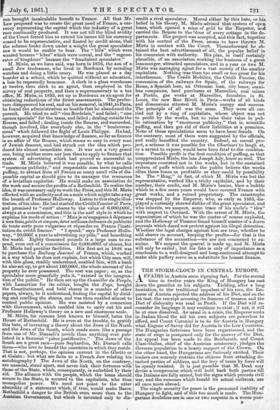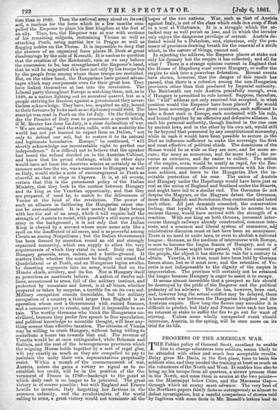THE STORM-CLOUD IN CENTRAL ElTROPE.
AFFAIRS in Austria seem ripening fast. For the second time in twelve years the King of Hungary has cast down the gauntlet to his subjects. Yielding, after a long hesitation, to the traditional impulses of his race, the Em- peror of Austria rejected the address of his Diet, and on the 1st inst. the rescript accusing its framers of treason and the Diet of disloyalty was read in Pesth. If the Diet will re- consider its language it may continue to exist ; if not, it will be at once dissolved. As usual in a crisis, the Emperor seeks in Italian blood the aid his own subjects are powerless to afford, and Count Coronini is to do for Austria in Hungary what Eugene of Savoy did for Austria in the Low Countries. The Hungarian fortresses have been regarrisoned, and the state of siege is postponed only for the answer of the Diet. An appeal has been made to the lteichsrath, and Count Clam-Gallas, chief of the Austrian aristocracy, pledges the German population to a hearty support of the Crown. On the other hand, the Hungarians are furiously excited. Their leaders can scarcely restrain the citizens from attacking de- tached parties of soldiers, and the levy of taxes by force will be openly resisted. It is just possible that M. Desk may devise a compromise which will hold back both parties till the Italians are fully armed, but the signs which precede civil war, and the rumours which herald its actual outbreak, are all once more abroad.
The single security for peace is the presumed inability of Hungary to fight, and of this too much is made. The Hun- garians doubtless are in one or two respects in a worse posi- n tion than in 1848. Then the national army stood on its owi aoil, a nucleus for the force which in a few months com- pelled the Emperor to place his first kingdom at the feet of an, ally. Then, too, the Emperor was at war with sections of his remaining subjects, restraining Vienna as well as attacking Pestb, using martial law in Prague as well as flogging nobles on the Theiss. It is impossible to deny that the absence of an organized force places M. Beak at great disadvantage by the side of Kossuth. It is useless to question that the creation of the Reicharath, vain as we may believe the concession to be, has strengthened the Emperor's hand, that he will be supported this time not only by his troops but by the people from among whom those troops are recruited. But, on the other hand, the Hungarians have gained advan- tages which may compensate even for their great loss. They have linked themselves at last into the revolution. The Liberal party throughout Europe is watching them, not, as in 1848, as a nation fighting out an ancestral quarrel, but as a people striving for freedom against a government they never- theless acknowledge. They have, too, acquired an ally, bound to their fortunes by links such as no diplomacy could weld. The rescript was read in Pesth on the let July. On the following day the Premier of Italy rose to pronounce a speech which, if M. Reuter has done his duty, is a clear declaration of war. "We are arming," said the stern noble, with an audacity the world has not yet learned to expect from an Italian, "not only to defend our soil, but to restore it to its natural and legitimate boundaries. Europe," be continued, "will shortly acknowledge our incontestable right to perfect our independence." It is difficult not to believe that the speaker had heard the refusal decided on in the Austrian Cabinet, and knew that his proud challenge, which in other days would have set loose the Austrian armies as certainly as the summer sets free the ice, was a summons to Hungary as well as Italy, would strike a note of encouragement in Pesth as cheerful as that it rings in Caprera. It is, at all events, certain that this is the permanent policy of the Italian Ministry, that they look to the contest between Hungary and its king as the Venetian opportunity, and that they are prepared, if need be, to march to the deliverance of Venice at the head of the revolution. The power of such an alliance in furthering the Hungarian cause can- not be over-estimated. It is not merely that Italy brings with her the aid of an army, which it will require half the atrength of Austria to resist, with possibly a still more potent army in the background ; it is not only that the Italian King is obeyed by a servant whose mere name acts like a spell on the disaffected of all races, and is as powerful among Croats as among Neapolitans ; but the Italian Government has been formed by accretion round an old and strongly organized monarchy, which can supply to allies the very requirements of which they stand in need. Italy can find Hungary generals, arms, cadres, and a battle-ground. It matters little whether the contest be fought out round the Quadrilateral or at Pesth, and an Hungarian legion swollen by deserting regiments into an army, would find on the Mincio chiefs, artillery, and its foe. Nor is Hungary itself so powerless as martinets believe. A nation of twelve mil- lions, accustomed to arms, full of the military instinct, and protected by mountain and forest, is at all times, whether prepared or taken by surprise, a terrible foe on its own soil. Military occupation sounds formidable, but the military occupation of a country a third larger than England is an operation whose cost a Government with .ruined finances, and a commerce yet to create, may find it impossible to sus- tain. The worthy Germans who think the Hungarians un- civilized, because they prefer free speech to free speculation, and political knowledge to scientific thought, will bear any- thing sooner than effective taxation. The citizens of Vienna may be willing to crush Hungary, without being willing to contribute a house tax towards that end. The revenue of Venetia would be at once extinguished, while Bohemia and Gallicia, and the rest of the heterogeneous provinces which the reigning House holds together by a sort of regal glue, will pay exactly as much as they are compelled to pay to maintain the unity their own representatives perpetually resist. Within a month of the commencement of war, Austria, unless she gains a victory so signal as to re- establish her credit, will be in the position of the Go- vernment. of France in. 1789—bankrupt to the point at which daily cash is no longer to be procured. The great victory is of course possible ; but with England and France hostile to invasion, Italy forgetting her factions in the common calamity, and the revolutionists of the world calling to arms, a great victory would not terminate all the hopes of the two nations. War, such as that of Austria against Italy, is not of the class which ends in a coup d'Etat in a tent at Villafranca. It is a struggle which the at- tacked may as well perish as lose, and in which the invader only enjoys the dangerous privilege of retreat. Austria de- feated would be a Dukedom and, victorious, only the pos., senor of provinces drawing breath for the renewal of a strife which, in the nature of things, cannot end. In rejecting the address, the Emperor places at stake not only his dynasty but the empire it has collected ; and all for what ? There is a strange opinion current in 'England that the House of Hapsburg must coerce Hungary, or suffer the empire to sink into a powerless federation. Recent events have shown, however, that the danger of this result has passed, that there is a cohesion among the non-Hungarian provinces other than that produced by Imperial authority. The Reichsrath can rule Austria peacefully enough, even if Hungary is permitted to rule herself. Suppose, therefore, the "wild" address not only received but accepted, in what position would the Emperor have been placed ? He would have been sovereign of two great countries, each sufficient to take a front rank in Europe, each contented with his rule and bound together by an offensive and defensive alliance. In each his personal authority, though limited in the one case by ancient laws and in the other by his own act, wpuld still be far beyond that possessed by any constitutional monarchy, while in each it would have been possible to secure in the Diet an influence sufficient to make the sovereign the first and most effective of political chiefs. The dominions of the House would be as wide as they are now, and far more se- cure; the army as numerous, and far more loyal ; the re- venue as extensive, and far easier to collect. The action of the empire, even, would be nearly as rapid, for the Em- peror could commence offensive movements with his Ger- man soldiers, and leave to the Hungarian Diet the in- evitable protection of his rear. The union of Austria and Hungary under the Hapsburgs woula have been just as real as the union of England and Scotland under the Stuarts, and might have led to a similar end. The Germans do not despise the Magyars, or the Magyars detest the Germans, more than English and Scotchmen then contemned and hated each other. All just demands conceded, the conservative feeling, that loyalty which always tends to accrete to an ancient throne, would have revived with the strength of a reaction. With one king on both thrones, incessant inter- course through railways already constructed, common lute, rests, and a common and liberal system of commerce, adi ruinistrative disunion must at last have been an annoyance. There is no need to unite laws, or even to abolish a national tongue : German, as the medium of intercourse with Europe, is sure to become the lingua franca of Hungary, and in a century the House might have gained, with the consent of the people, the object it has striven in vain for a century to obtain. Venetia, it is true, must have been held by German forces alone, but so it must now, and the retention of Ve- netia is not indispensable to the dignity of the empire it impoverishes. The province will certainly not be retained the longer because Hungary is eager to assist it to escape. It seems almost incredible that a prospect so fair should be destroyed by the pride of the Emperor and the political pedantry of his advisers. The die has, however, been cast, and, however long the actual conflict may be delayed, there is henceforth war between the Hungarian kingdom and the Austrian empire. How long the flames may smoulder it is difficult to predict, but Italy and France have each too keen an interest at stake to suffer the fire to go out for want of stirring. Unless some wholly unexpected event should intervene, Austria, in the spring, will be once more on its trial for its life.































 Previous page
Previous page